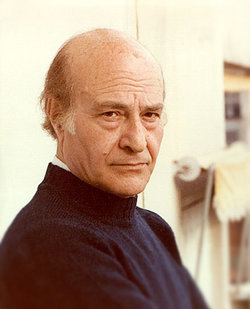Also known as:
Odysseas Elitis, Odisseas Elitis, Odysseas Alepoudellis, Οδυσσέας Ελύτης, Οδυσσέας Αλεπουδέλλης
More People of Greece
More Topic Categories
Related Destinations
Odysseas Elytis (02/11/1911 - 18/03/1996)
 Odysseas Elytis was one of the most important Greek poets. He received the National Poetry Award in 1960 and the Nobel Prize in Literature in 1979.
Odysseas Elytis was one of the most important Greek poets. He received the National Poetry Award in 1960 and the Nobel Prize in Literature in 1979.His real name was Odysseas Alepoudellis and he was born in 1911 in Heraklion. His father had a soap factory and an olive oil factory in Crete, which in 1914 he moved to Piraeus, and his family followed him to Athens. Odysseas enrolled at a private school in 1917. After the fall of Venizelos in 1920, his family was prosecuted for supporting him and his father was eventually arrested. In 1923, he travelled with his family in Europe, visiting Italy, Switzerland, and Germany, while in Lausanne, Elytis was acquainted to the now exiled Venizelos.
During his secondary education, he got acquainted with Modern Greek literature and was deeply influenced. He balanced reading with hiking in the mountains of Attica; in 1927, he was diagnosed with overwork and a gland disease, effectively making him stay in bed for three months. As a result, he completely stopped his athletic activities and turned to literature. In 1928, he started studying to enroll at the School of Chemistry, pressed by his parents. Nevertheless, he soon gave up and instead enrolled at the Law School of University of Athens in 1930. He also started reading Modern Greek poetry.
According to Elytis, 1935 was a crucial year in his career. He met Empeirikos, another important poet of the time, who introduced hyperrealism to the Greek reader. Elytis was influenced by this movement and he saw a new door opening in front of him. Some of his acquaintances retained some of Elytis’ poems and published them under the alias Odysseas Vranas. When Elytis found out, he initially asked for their removal, but he soon accepted that they would be published under the alias Odysseas Elytis. In 1939, he abandoned his law studies, and eventually published his first collection of poems.
During World War II, Elytis actively participated but was later admitted to hospital because of typhoid. In 1948, he went to Paris and studied philosophy at University of Sorbonne. Returning to Greece in 1952, he became member of the Group of Twelve, giving literature awards. The following years, he continued publishing poems and was quite fruitful in his writings. During the Regime of the Colonels, in 1969, he went to Paris but refused to publish poems there as a protest against the dictatorship. He also denied the Literature Award the regime offered him. In 1979, he received the Nobel Prize in Literature, thus gaining considerable reputation. Numerous awards followed inside and outside Greece. He died in Athens in 1996, after a heart attack.
See Also:
 Athens Photos
Athens Photos
 Santorini Photos
Santorini Photos
 Crete Photos
Crete Photos
 Meteora Photos
Meteora Photos
 Corfu Photos
Corfu Photos



